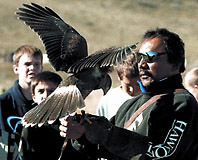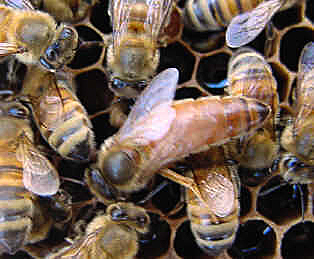|
Greetings!
FRBC: A Nature Center For You and Your
Family
| WINTER TIPS from our friends at Duncraft |
 |

1. Provide a Variety of Different Bird Feeders.
A hanging feeder will appeal most to seed-eating
birds such as chickadees that feed naturally at tree
level. Ground level platforms, or those just a few feet
off the ground -- will appeal to towhees and Juncos.
Suet feeders will bring woodpeckers -- and many
others, too! So a variety of feeders, with a variety
of foods will bring the greatest variety of birds.
2. Offer Shelter.
Shelter on a cold winter's night can be a lifesaver for
wild birds. Your spring nest box, if cleaned out, can
provide such shelter. And winter roosting boxes are
available. Another backyard haven can be a pile of
brush where birds can take refuge from the elements.
3. Best Seed: Black Oil Sunflower Seed.
Not appealing to pigeons,
sparrows and blackbirds, and accepted eagerly by
small songbirds. There are many good seed blends --
but your birds will always love this pure favorite!
4. Deal With Squirrels.
You can baffle them, and/or install squirrel-proof
feeders. Because the fact is: if there is a squirrel on
your feeder -- the birds won't come. In
addition, you may start a distraction feeding area
just for them in another part of your yard--keep them
busy with their own squirrel toys and corn-cobs!
5. Provide Ice-Free Water.
Water is a necessity. In cold weather natural water
sources freeze over. A heater in your bath or a
heated birdbath create a winter oasis--drawing birds
from neighboring areas.
Happy birding all winter!
Mike Dunn & Sharon Dunn
|
| Chick a dee dee dee....A Front Range Favorite |
 |

This fairly tame and common visitor to our Front
Range feeders has to be my favorite backyard winter
bird. Most of the year their diet consists of insects
and spiders. During the cold months they replace that
diet with high fat and protein from your peanut,
sunflower, and suet feeders. Many times they will fly
right up to the feeder you are servicing seemingly
trying to hurry you up. Actually this very complex
avian species has many amateur and professional
ornithologists trying to learn more about them.
Chickadees generally stay in one area all season so
you can name the ones that visit you. You will enjoy
watching their signature behavior of casing out your
feeder from a nearby tree or shrub. They will dart to
it and with several flicks of the beak and body, dart
back to the safety of the same branch. Back and
forth they go for long periods of time. Often they will
hide seeds in a stash so as to retrieve them latter.
Both male and female have similar very recognizable
markings. If you live close to the foothills you can
find both the black capped and mountain varieties. I
must say it is pretty cool to verify your first
Mountain chickadee sighting.
Chickadees will flock together and seem to always be
in pairs. On cold nights they huddle together in old
nests, birdhouses, or roosting boxes. This spring
they will build a nest in a tree cavity or use a
provided nest box from you.
Chickadees belong to the titmouse family, Paridae.
The scientific name of the black-capped chickadee is
Poecile atricapilla. Their chickadee name of course
comes from its distinguished chick – a – dee – dee
call. Deciphering the incredible variations to this call
has been the subject of many an ornithologist’s study.
Enjoy the antics and calls of the chickadee this
winter by providing them a great habitat in your
backyard. You will be thoroughly entertained!
|
| FRONT RANGE BIRDING OPEN HOUSE APRIL 29-30 by Sara Nelson |
 |

Mark your calendars for our 2nd annual open house
set for Saturday and Sunday, April 29 and 30.
HAWKQUEST will return as the featured
attraction on the 29th along with our Arts and
Crafts Fair. On the 30th the annual Dove
Race for Youth will take place as we release
approximately 300 homing pigeons for charity. Watch
for details in the coming months. Get set for an early
Spring Blast!
|
| FRBC Free Seminar Series Presents: Beginning Beekeeping Jan 21 2006 1-3pm |
 |

January’s seminar will feature Jerry Webb, noted local
beekeeper and owner of the Beekeeper Company.
Jerry will introduce you to the art and science of
beekeeping as a backyard hobby. The life and times
of bees are fascinating. You will be amazed at how
the social behavior of a bee colony operates and how
important they are to nature’s structure. Of course
the added benefit to the beekeeping hobby is loads
of delicious honey for you and your family!
Topics covered will include:
- a review of a beekeepers year
- pollination
-the honey harvest and extraction
-what really goes on inside the hive.
Knowledge learned at the seminar will help expand
your understanding of nature, local plants, gardening,
and the difference between beneficial and
destructive insects. Both young and adult will find
this seminar fascinating.
You will actually see a live Queen being attended
by worker bees in an active observation hive!
We will also touch on the Mason bee and other
native bees working hard in your backyard. We sell
Mason bee houses at the store as well as live bees to
help start your own colony.
Location of seminar will be at the Audubon Society of
Greater Denver’s “classroom in the wild” on Waterton
Road 4 miles south of C-470 in Waterton Canyon.
Afterwards all attendees are invited to visit Jerry
Webb’s store and honey house a short distance away.
Call or email the store to reserve a place for you at
the seminar. We will be happy to help provide
detailed driving instructions.
Hope to see you there. Tom & Diane
(Look for future seminars on
Falconry,
wildlife sketching, optics, and native plants.)
|
| A GREAT HOBBY: WITH A TOUCH OF RESPONSIBILITY |
 |

With winter brings the question of what role do we as
humans play in providing a source of food and water
for birds? Fact is we can be very helpful during the
cold winter months when their natural food sources
are either covered or in short supply.
By using several feeders with several types of seed
and spreading them out in the backyard you can
accomplish a lot. You will be attracting a wide variety
of birds and reducing the stress of “single feeder
competition.” At the same time you will enjoy the
added benefit of better viewing and photographic
opportunities.
When choosing seed, look for those that provide high
fat and protein. These elements will enable birds to
keep warm during cold and windy conditions,
especially at night. Sunflower, Nyjer, peanuts, and
suet, when used in appropriate feeders, are best for
many species. If you have only one or two feeding
stations use mixes that contain relatively small
amounts of millet and just say no to Milo.
This winter expect to see Chickadees, Wrens,
Flickers, Downey and Hairy Woodpeckers, several
types of Dark-eyed Juncos, Scrub and Eastern Jays,
Sparrows, House Finches, and American Goldfinches.
With patience many other varieties may visit,
especially when you add a reliable water source. As
temperatures drop below freezing your heated
birdbath becomes a liquid magnet for essentially
every type of bird in the area. Dehydration can be
more of a threat to birds in the frozen dead of winter
than starvation or exposure.
If you do offer water and seed please help prevent
the spread of disease by emptying baths and feeders
once a week and cleaning them in a 10 percent
solution of household bleach.
Enjoy this perfectly “natural” hobby all year.
Tom.
|
|
So long Pepper ole pal. You never met a person you
did't like.
|
|
|
|
|
|
|
With a heavy heart we report late sad news to
you.
Pepper, our loyal dog and companion, has
passed away after a
sudden illness.
We will miss him terribly and the joy he brought
to all who knew him.
|
The Front Range Birding Company - A Proud Corporate Sponsor of the Audubon Society of Greater Denver

TILLEY WINTER HATS - Great hat for in the field!


Great Optics are here at FRBC


Our wild bird food is delivered fresh each week from the Audubon Park Company in Akron, Colorado.


We supply the best value and function in all types of bird feeders. The Droll Yankee feeder is among the best offering a lifetime warranty!


|